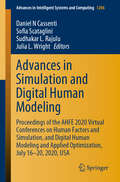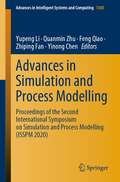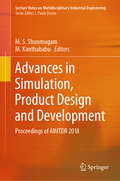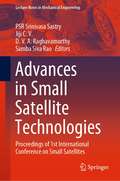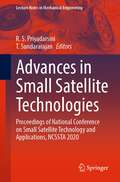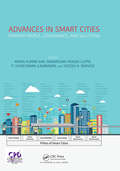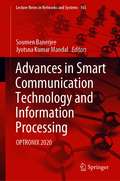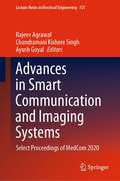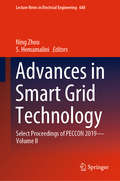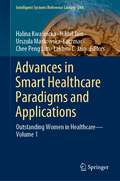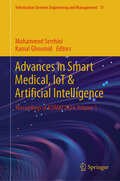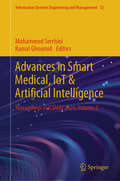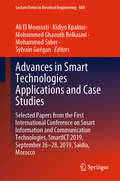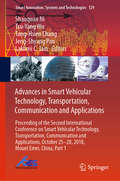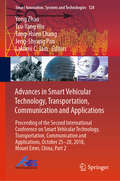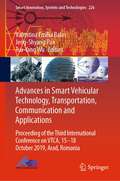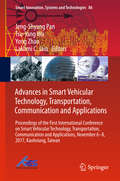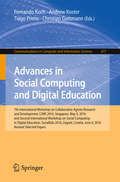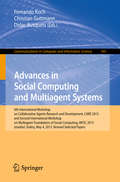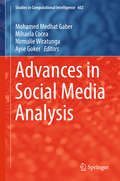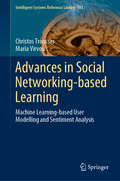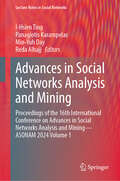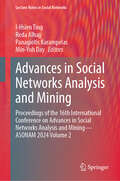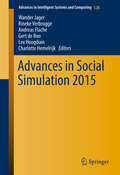- Table View
- List View
Advances in Simulation and Digital Human Modeling: Proceedings of the AHFE 2020 Virtual Conferences on Human Factors and Simulation, and Digital Human Modeling and Applied Optimization, July 16-20, 2020, USA (Advances in Intelligent Systems and Computing #1206)
by Daniel N Cassenti Sofia Scataglini Sudhakar L. Rajulu Julia L. WrightThis book presents the latest advances in modeling and simulation for human factors research. It reports on cutting-edge simulators such as virtual and augmented reality, multisensory environments, and modeling and simulation methods used in various applications, including surgery, military operations, occupational safety, sports training, education, transportation and robotics. Based on two AHFE 2020 Virtual Conferences such as the AHFE 2020 Virtual Conference on Human Factors and Simulation and the AHFE 2020 Virtual Conference on Digital Human Modeling and Applied Optimization, held on July 16–20, 2020, the book serves as a timely reference guide for researchers and practitioners developing new modeling and simulation tools for analyzing or improving human performance. It also offers a unique resource for modelers seeking insights into human factors research and more feasible and reliable computational tools to foster advances in this exciting field.
Advances in Simulation and Process Modelling: Proceedings of the Second International Symposium on Simulation and Process Modelling (ISSPM 2020) (Advances in Intelligent Systems and Computing #1305)
by Quanmin Zhu Yinong Chen Feng Qiao Yupeng Li Zhiping FanThis book gathers the selected papers from the Second International Symposium on Simulation and Process Modelling (ISSPM 2020), which was held online on August 29-30, 2020, due to COVID-19 pandemic. The Symposium provides a forum in virtual presentation for scholars, researchers and practitioners who are interested in the modelling and simulation of business processes, production and industrial processes, service and administrative processes, and public sector processes to develop theory and practice of simulation and process modelling.
Advances in Simulation, Product Design and Development: Proceedings of AIMTDR 2018 (Lecture Notes on Multidisciplinary Industrial Engineering)
by M. S. Shunmugam M. KanthababuThis volume comprises select proceedings of the 7th International and 28th All India Manufacturing Technology, Design and Research conference 2018 (AIMTDR 2018). The papers in this volume discuss simulations based on techniques such as finite element method (FEM) as well as soft computing based techniques such as artificial neural network (ANN), their optimization and the development and design of mechanical products. This volume will be of interest to researchers, policy makers, and practicing engineers alike.
Advances in Small Satellite Technologies: Proceedings of 1st International Conference on Small Satellites (Lecture Notes in Mechanical Engineering)
by Psr Srinivasa Sastry Jiji C. V. D. V. A. Raghavamurthy Samba Siva RaoThis volume contains select papers presented during the 1st International Conference on Small Satellites, discussing the latest research and developments relating to small satellite technology. The papers cover various issues relating to design and engineering, ranging from the control, mechanical and thermal systems to the sensors, antennas and RF systems used. The volume will be of interest to scientists and engineers working on or utilizing satellite and space technologies.
Advances in Small Satellite Technologies: Proceedings of National Conference on Small Satellite Technology and Applications, NCSSTA 2020 (Lecture Notes in Mechanical Engineering)
by R. S. Priyadarsini T. SundararajanThis book contains select papers presented during the 2nd National Conference on Small Satellites, discussing the latest research and developments relating to small satellite technology. The papers cover various issues relating to design and engineering, ranging from the control, mechanical, and thermal systems to the sensors, antennas, and RF systems used. The book is of interest to scientists and engineers working on or utilizing satellite and space technologies.
Advances in Smart Cities: Smarter People, Governance, and Solutions
by Yogesh K. Dwivedi Arpan Kumar Kar P. Vigneswara Ilavarasan M P GuptaThis is an edited book based on the selected submissions made to the conference titled "International Conference in Smart Cities". The project provides an innovative and new approach to holistic management of cities physical, socio-economic, environmental, transportation and political assets across all domains, typically supported by ICT and open data.
Advances in Smart Communication Technology and Information Processing: OPTRONIX 2020 (Lecture Notes in Networks and Systems #165)
by Jyotsna Kumar Mandal Soumen BanerjeeThis book is a collection of best selected research papers presented at the 6th International Conference on Opto-Electronics and Applied Optics (OPTRONIX 2020) organized by the University of Engineering & Management, Kolkata, India, in June 2020. The primary focus is to address issues and developments in optoelectronics with particular emphasis on communication technology, IoT and intelligent systems, information processing and its different kinds. The theme of the book is in alignment with the theme of the conference “Advances in Smart Communication Technology and Information Processing.” The purpose of this book is to inform the scientists and researchers of this field in India and abroad about the latest developments in the relevant field and to raise awareness among the academic fraternity to get them involved in different activities in the years ahead – an effort to realize knowledge-based society.
Advances in Smart Communication and Imaging Systems: Select Proceedings of MedCom 2020 (Lecture Notes in Electrical Engineering #721)
by Rajeev Agrawal Chandramani Kishore Singh Ayush GoyalThis book presents select and peer-reviewed proceedings of the International Conference on Smart Communication and Imaging Systems (MedCom 2020). The contents explore the recent technological advances in the field of next generation communication systems and latest techniques for image processing, analysis and their related applications. The topics include design and development of smart, secure and reliable future communication networks; satellite, radar and microwave techniques for intelligent communication. The book also covers methods and applications of GIS and remote sensing; medical image analysis and its applications in smart health. This book can be useful for students, researchers and professionals working in the field of communication systems and image processing.
Advances in Smart Computing and Applications: First International Conference, ICASCA 2025, Ahmedabad, India, February 15–16, 2025, Proceedings (Communications in Computer and Information Science #2619)
by Rajkumar Buyya Nirbhay Chaubey Savita Gandhi Harshal Arolkar Prerna AgrawalThis book constitutes the refereed proceedings of the 1st International Conference on Advances in Smart Computing and Applications, ICASCA 2025, held in Ahmedabad, India, during February 15–16, 2025. The 25 full papers were presented in this volume were carefully reviewed and selected from 112 submissions. They focus on Machine Learning, Deep Learning, Transfer Learning, Neural Computing, Artificial Intelligence, Reinforcement Learning, Recommendation systems, Soft computing, Intelligent Systems, Pattern Recognition, Natural Language Processing, Big Data Analytics, Networks, Text Mining, Web Mining, Data Streams, Image Processing, Distributed Databases, Block Chain.
Advances in Smart Grid Technology: Select Proceedings of PECCON 2019—Volume II (Lecture Notes in Electrical Engineering #688)
by Ning Zhou S. HemamaliniThis book comprises the select proceedings of the International Conference on Power Engineering Computing and Control (PECCON) 2019. This volume covers several important topics such as optimal data selection and error-free data acquiring via artificial intelligence and machine learning techniques, information and communication technologies for monitoring and control of smart grid components, and data security in smart grid network. In addition, it also focuses on economics of renewable electricity generation, policies for distributed generation, smart eco-structures and systems. This book can be useful for beginners, researchers as well as professionals interested in the area of smart grid technology.
Advances in Smart Healthcare Paradigms and Applications: Outstanding Women in Healthcare—Volume 1 (Intelligent Systems Reference Library #244)
by Lakhmi C. Jain Chee Peng Lim Halina Kwaśnicka Nikhil Jain Urszula Markowska-KaczmarThis book is dedicated to showcase research and innovation in smart healthcare systems and technologies led by women scientists, researchers, and practitioners. With the advent of artificial intelligence (AI) and related technologies, the healthcare sector has undergone tremendous changes in practice and management in recent years. On par to men, women have made significant contributions to tackle a variety of healthcare problems, creating smarter paradigms to provide effective and efficient solutions for patients and stakeholders. The book presents a small collection of contributions by outstanding women in STEM (Science, Technology, Engineering and Mathematics) education, focusing on the healthcare domain. The selected articles allow readers to comprehend current advances in AI and other methods for undertaking healthcare challenges. It is envisaged that the inspiring work by prominent women scientists, researchers, and practitioners reported in this book offers a beacon to propel women in pursuing STEM education and advancing the healthcare sector for the benefits of humankind.
Advances in Smart Medical, IoT & Artificial Intelligence: Proceedings of ICSMAI'2024, Volume 1 (Information Systems Engineering and Management #11)
by Mohammed Serrhini Kamal GhoumidThis comprehensive book brings together the brightest minds in academic, featuring a curated selection of papers and presentations from the esteemed conference. With a focus on the intersection of the conference themes, this book provides a unique platform for researchers, practitioners, and innovators to share their cutting-edge research, innovations, and solutions. Get ready to dive into the latest advancements in Artificial Intelligence and Internet of Things for Healthcare, Computer Vision, world of computer science, featuring advancements in machine learning, natural language processing, and more with the Proceedings of SMAI2024. This book presents a comprehensive and interdisciplinary examination of the applications, challenges, and implications of AI-IoT convergence in different contexts such Smart Healthcare/Smart Technologies/Smart Industry, computer vision, and NLP. Through a series of erudite chapters, esteemed experts in computer sciences, healthcare, physics, technology, and research domains provide authoritative insights into the transformative potential of this synergy. As editors, we are proud to present a curated collection of contributions that reflect the latest research findings, innovations, and best practices in IA technology. The editors’ objective is to provide a nuanced and authoritative exploration of the AI-IoT nexus, with the aim of inspiring further research, collaboration, and innovation in the pursuit of excellence in Artificial Intelligence.
Advances in Smart Medical, IoT & Artificial Intelligence: Proceedings of ICSMAI'2024, Volume 2 (Information Systems Engineering and Management #12)
by Mohammed Serrhini Kamal GhoumidThis comprehensive book brings together the brightest minds in academic, featuring a curated selection of papers and presentations from the esteemed conference. With a focus on the intersection of the conference themes, this book provides a unique platform for researchers, practitioners, and innovators to share their cutting-edge research, innovations, and solutions. Get ready to dive into the latest advancements in Artificial Intelligence and Internet of Things for Healthcare, Computer Vision, world of computer science, featuring advancements in machine learning, natural language processing, and more with the Proceedings of SMAI2024. This book presents a comprehensive and interdisciplinary examination of the applications, challenges, and implications of AI-IoT convergence in different contexts such Smart Healthcare/Smart Technologies/Smart Industry, computer vision, and NLP. Through a series of erudite chapters, esteemed experts in computer sciences, healthcare, physics, technology, and research domains provide authoritative insights into the transformative potential of this synergy. As editors, we are proud to present a curated collection of contributions that reflect the latest research findings, innovations, and best practices in IA technology. The editors’ objective is to provide a nuanced and authoritative exploration of the AI-IoT nexus, with the aim of inspiring further research, collaboration, and innovation in the pursuit of excellence in Artificial Intelligence.
Advances in Smart Technologies Applications and Case Studies: Selected Papers from the First International Conference on Smart Information and Communication Technologies, SmartICT 2019, September 26-28, 2019, Saidia, Morocco (Lecture Notes in Electrical Engineering #684)
by Ali El Moussati Kidiyo Kpalma Mohammed Ghaouth Belkasmi Mohammed Saber Sylvain GuéganThis book offers a comprehensive snapshot of practically-relevant developments in the field of smart information technologies. Including selected papers presented at the First International Conference on Smart Information and Communication Technologies, SmartICT 2019, held on September 26-28, in 2019, Saidia, Morocco, it reports on practical findings, and includes useful tutorials concerning current technologies and suggestions to improve them. It covers a wide range of applications, from health and energy management, to digital education, agriculture and cybersecurity, providing readers with a source of new ideas for future research and collaborations.
Advances in Smart Vehicular Technology, Transportation, Communication and Applications: Proceeding of the Second International Conference on Smart Vehicular Technology, Transportation, Communication and Applications, October 25-28, 2018 Mount Emei, China, Part 1 (Smart Innovation, Systems and Technologies #129)
by Lakhmi C. Jain Jeng-Shyang Pan Tsu-Yang Wu Shaoquan Ni Tang-Hsien ChangThis book highlights papers presented at the Second International Conference on Smart Vehicular Technology, Transportation, Communication and Applications (VTCA 2018), which was held at Mount Emei, Sichuan Province, China from 25 to 28 October 2018. The conference was co-sponsored by Springer, Southwest Jiaotong University, Fujian University of Technology, Chang’an University, Shandong University of Science and Technology, Fujian Provincial Key Lab of Big Data Mining and Applications, and the National Demonstration Center for Experimental Electronic Information and Electrical Technology Education (Fujian University of Technology). The conference was intended as an international forum for researchers and professionals engaged in all areas of smart vehicular technology, vehicular transportation, vehicular communication, and applications.
Advances in Smart Vehicular Technology, Transportation, Communication and Applications: Proceeding of the Second International Conference on Smart Vehicular Technology, Transportation, Communication and Applications, October 25-28, 2018 Mount Emei, China, Part 2 (Smart Innovation, Systems and Technologies #128)
by Lakhmi C. Jain Jeng-Shyang Pan Yong Zhao Tsu-Yang Wu Tang-Hsien ChangThis book highlights papers presented at the Second International Conference on Smart Vehicular Technology, Transportation, Communication and Applications (VTCA 2018), which was held at Mount Emei, Sichuan Province, China from 25 to 28 October 2018. The conference was co-sponsored by Springer, Southwest Jiaotong University, Fujian University of Technology, Chang’an University, Shandong University of Science and Technology, Fujian Provincial Key Lab of Big Data Mining and Applications, and the National Demonstration Center for Experimental Electronic Information and Electrical Technology Education (Fujian University of Technology). The conference was intended as an international forum for researchers and professionals engaged in all areas of smart vehicular technology, vehicular transportation, vehicular communication, and applications.
Advances in Smart Vehicular Technology, Transportation, Communication and Applications: Proceeding of the Third International Conference on VTCA, 15–18 October 2019, Arad, Romania (Smart Innovation, Systems and Technologies #226)
by Jeng-Shyang Pan Valentina Emilia Balas Tsu-Yang WuThis book constitutes the Proceedings of The Third International Conference on Smart Vehicular Technology, Transportation, Communication and Applications (VTCA 2019), Arad, Romania, held on October 15–18 October 2019 in Arad, Romania. This edition is technically co-sponsored by “Aurel Vlaicu” University of Arad, Romania, Southwest Jiaotong University, Fujian University of Technology, Chang’an University, Shandong University of Science and Technology, Fujian Provincial Key Lab of Big Data Mining and Applications, and National Demonstration Center for Experimental Electronic Information and Electrical Technology Education (Fujian University of Technology), China, Romanian Academy and General Association of Engineers in Romania - Arad Section. The book covers a range of topics including algorithms for optimization, video processing, parking management, IoT, software testing, cryptanalysis, NLP, CNN, wireless sensors network, adaptive security, data protection, green transportation, AI, smart cities, train control, analytic hierarchy process, big data, car following model, etc. The books help to disseminate the knowledge about some active research directions in the field Vehicle Technology and Communication. The book provides useful information to professors, researchers and graduated students in area of Vehicle Technology and Communication.
Advances in Smart Vehicular Technology, Transportation, Communication and Applications: Proceedings of the First International Conference on Smart Vehicular Technology, Transportation, Communication and Applications, November 6-8, 2017, Kaohsiung, Taiwan (Smart Innovation, Systems and Technologies #86)
by Lakhmi C. Jain Jeng-Shyang Pan Yong Zhao Tsu-Yang WuThis book presents papers from the First International Conference on Smart Vehicular Technology, Transportation, Communication and Applications (VTCA 2017). Held from 6 to 8 November 2017 in Kaohsiung, Taiwan, the conference was co-sponsored by Springer, Fujian University of Technology in China, Fujian Provincial Key Laboratory of Digital Equipment, Fujian Provincial Key Lab of Big Data Mining and Applications, and National Kaohsiung University of Applied Sciences in Taiwan. The book is a valuable resource for researchers and professionals engaged in all areas of smart vehicular technology, vehicular transportation, vehicular communication, and applications.
Advances in Social Computing and Digital Education: 7th International Workshop on Collaborative Agents Research and Development, CARE 2016, Singapore, May 9, 2016 and Second International Workshop on Social Computing in Digital Education, SocialEdu 2016, Zagreb, Croatia, June 6, 2016, Revised Selected Papers (Communications in Computer and Information Science #677)
by Fernando Koch Christian Guttmann Andrew Koster Tiago PrimoThis book constitutes the refereed proceedings of the 7th International Workshop on Collaborative Agents Research and Development, CARE 2016, held in Singapore in May 2016 and Second International Workshop on Social Computing in Digital Education, SocialEdu 2016, held in Zagreb, Croatia, in June 2016. For CARE 2016 there were 4 papers selected out of 7 submissions, and for SocialEdu 5 papers were selected from 7 submissions. The 9 extended and revised full papers presented were carefully reviewed. The papers deal with topics like techniques of continuous monitoring, human behaviour analysis, recommendation systems, adjustment of education activities, intelligent content placement, and others.
Advances in Social Computing and Multiagent Systems: 6th International Workshop on Collaborative Agents Research and Development, CARE 2015 and Second International Workshop on Multiagent Foundations of Social Computing, MFSC 2015, Istanbul, Turkey, May 4, 2015, Revised Selected Papers (Communications in Computer and Information Science #541)
by Fernando Koch Christian Guttmann Didac BusquetsThis book constitutes thoroughly revised, selected papers of the proceedings of the 6th International Workshop on Collaborative Agents Research and Development, CARE 2015 and the Second International Workshop on Multi-agent Foundations of Social Computing, MFSC 2015, held in Istanbul, Turkey, on May 4, 2015. Both Workshops were held in conjunction with AAMAS 2015. The 5 revised full papers of CARE and the 7 full papers of MFSC presented were carefully selected from 14 CARE and 10 MFSC submissions. Both workshop address issues in relevant areas of social computing such as smart societies, social applications, urban intelligence, intelligent mobile services, models of teamwork and collaboration.
Advances in Social Media Analysis (Studies in Computational Intelligence #602)
by Mihaela Cocea Mohamed Medhat Gaber Nirmalie Wiratunga Ayse GokerThis volume presents a collection of carefully selected contributions in the area of social media analysis. Each chapter opens up a number of research directions that have the potential to be taken on further in this rapidly growing area of research. The chapters are diverse enough to serve a number of directions of research with Sentiment Analysis as the dominant topic in the book. The authors have provided a broad range of research achievements from multimodal sentiment identification to emotion detection in a Chinese microblogging website. The book will be useful to research students, academics and practitioners in the area of social media analysis.
Advances in Social Networking-based Learning: Machine Learning-based User Modelling and Sentiment Analysis (Intelligent Systems Reference Library #181)
by Maria Virvou Christos TroussasThis book discusses three important, hot research issues: social networking-based learning, machine learning-based user modeling and sentiment analysis. Although these three technologies have been widely used by researchers around the globe by academic disciplines and by R&D departments in the IT industry, they have not yet been used extensively for the purposes of education. The authors present a novel approach that uses adaptive hypermedia in e-learning models to personalize educational content and learning resources based on the needs and preferences of individual learners. According to reports, in 2018 the vast majority of internet users worldwide are active on social networks, and the global average social network penetration rate as of 2018 is close to half the population. Employing social networking technologies in the field of education allows the latest technological advances to be used to create interactive educational environments where students can learn, collaborate with peers and communicate with tutors while benefiting from a social and pedagogical structure similar to a real class. The book first discusses in detail the current trend of social networking-based learning. It then provides a novel framework that moves further away from digital learning technologies while incorporating a wide range of recent advances to provide solutions to future challenges. This approach incorporates machine learning to the student-modeling component, which also uses conceptual frameworks and pedagogical theories in order to further promote individualization and adaptivity in e-learning environments. Moreover, it examines error diagnosis, misconceptions, tailored testing and collaboration between students are examined and proposes new approaches for these modules. Sentiment analysis is also incorporated into the general framework, supporting personalized learning by considering the user’s emotional state, and creating a user-friendly learning environment tailored to students’ needs. Support for students, in the form of motivation, completes the framework. This book helps researchers in the field of knowledge-based software engineering to build more sophisticated personalized educational software, while retaining a high level of adaptivity and user-friendliness within human–computer interactions. Furthermore, it is a valuable resource for educators and software developers designing and implementing intelligent tutoring systems and adaptive educational hypermedia systems.
Advances in Social Networks Analysis and Mining: Proceedings of the 16th International Conference on Advances in Social Networks Analysis and Mining - ASONAM 2024 Volume 1 (Lecture Notes in Social Networks)
by I-Hsien Ting Panagiotis Karampelas Reda Alhajj Min-Yuh DayThis book explores the evolution of social network analysis and mining (SNAM), a field that originated in social and business communities but has expanded significantly in recent years. The rise of online social platforms, email logs, phone records, and instant messaging systems has driven the development of advanced techniques for analyzing social networks, drawing heavily on graph theory and machine learning. As the Web increasingly becomes a social medium, it fosters human interaction, the sharing of experiences and knowledge, and the formation and evolution of communities. This transformation has amplified the importance of SNAM in fields such as academia, politics, homeland security, and business, where understanding the complex relationships between networked actors is crucial. This volume presents a comprehensive collection of cutting-edge research and developments in SNAM, offering a valuable resource for researchers and practitioners seeking to deepen their understanding of social networks and their applications.
Advances in Social Networks Analysis and Mining: Proceedings of the 16th International Conference on Advances in Social Networks Analysis and Mining - ASONAM 2024 Volume 2 (Lecture Notes in Social Networks)
by I-Hsien Ting Panagiotis Karampelas Reda Alhajj Min-Yuh DayThis book explores the evolution of social network analysis and mining (SNAM), a field that originated in social and business communities but has expanded significantly in recent years. The rise of online social platforms, email logs, phone records, and instant messaging systems has driven the development of advanced techniques for analyzing social networks, drawing heavily on graph theory and machine learning. As the Web increasingly becomes a social medium, it fosters human interaction, the sharing of experiences and knowledge, and the formation and evolution of communities. This transformation has amplified the importance of SNAM in fields such as academia, politics, homeland security, and business, where understanding the complex relationships between networked actors is crucial. This volume presents a comprehensive collection of cutting-edge research and developments in SNAM, offering a valuable resource for researchers and practitioners seeking to deepen their understanding of social networks and their applications.
Advances in Social Simulation 2015 (Advances in Intelligent Systems and Computing #528)
by Rineke Verbrugge Wander Jager Andreas Flache Gert De Roo Lex Hoogduin Charlotte HemelrijkThis book highlights recent developments in the field, presented at the Social Simulation 2015 conference in Groningen, The Netherlands. It covers advances both in applications and methods of social simulation. Societal issues addressed range across complexities in economic systems, opinion dynamics and civil violence, changing mobility patterns, different land-use, transition in the energy system, food production and consumption, ecosystem management and historical processes. Methodological developments cover how to use empirical data in validating models in general, formalization of behavioral theory in agent behavior, construction of artificial populations for experimentation, replication of models, and agent-based models that can be run in a web browser. Social simulation is a rapidly evolving field. Social scientists are increasingly interested in social simulation as a tool to tackle the complex non-linear dynamics of society. Furthermore, the software and hardware tools available for social simulation are becoming more and more powerful. This book is an important source for readers interested in the newest developments in the ways in which the simulation of social interaction contributes to our understanding and managing of complex social phenomena.
